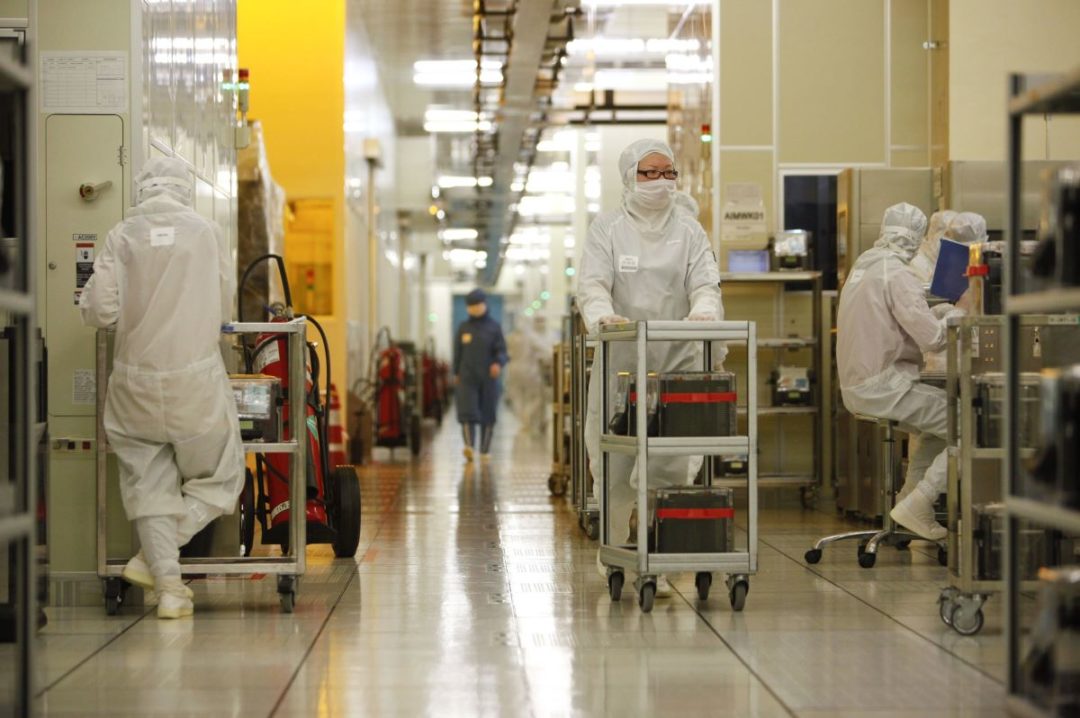
Home » China Urges Japan to Refrain From Joining U.S. Chip Curbs
China Urges Japan to Refrain From Joining U.S. Chip Curbs

Photo: Bloomberg
April 6, 2023
China’s Foreign Minister Qin Gang urged Japan to refrain from supporting U.S. efforts to suppress the Chinese semiconductor industry, while his counterpart pressed for the swift return of a Japanese citizen detained by Beijing.
During a meeting with his Japanese counterpart Yoshimasa Hayashi in Beijing on April 2, Qin said a chip blockade will only strengthen Beijing’s resolve to achieve self-reliance, according to a Foreign Ministry statement.
“In the past, the U.S. ruthlessly suppressed the Japanese semiconductor industry, but now it is repeating its old tactics toward China,” Qin said, according to the statement. “Don’t do to others what you don’t want others to do to you.”
He added that China looks forward to working together for better bilateral relations, according to a Chinese Foreign Ministry statement.
Hayashi’s visit to China’s capital is the first such trip by a top Tokyo diplomat in more than three years. It comes after China on March 31 condemned Japan’s introduction of restrictions on exports of 23 types of leading-edge chipmaking technologies. Japan tightened trade controls as its ally, the U.S., ratchets up efforts to limit Chinese access to key semiconductor knowhow.
Ties between Beijing and Tokyo have frayed in recent years as Japan joined U.S.-led moves to counter China’s regional influence through institutions such as the Quad group, which includes Australia and India.
Nonetheless, Japan has sought to maintain stable relations with its biggest trading partner.
Meanwhile concern is rising in Tokyo over the detention of an employee of Astellas Pharma Inc. in China.
Hayashi protested the detention and urged that the man be released in his meeting with Qin, as well as in discussions with Premier Li Qiang and top diplomat Wang Yi, according to statements from Japan’s foreign ministry.
“When conducting business and people-to-people exchanges, it is extremely important to have an environment where Japanese citizens and companies are able to conduct activities free from anxiety,” he said. Seventeen Japanese have been detained in China since 2015, a foreign ministry official told parliament in March. Five are still in Chinese custody, of whom two have received sentences.
Japanese Prime Minister Fumio Kishida told lawmakers on March 27 that his country would continue to call for the early release of the detained person.
The Asian neighbors face a raft of bilateral problems including a long-running standoff over disputed islands in the East China Sea. China has also expressed opposition to Japan’s plans to release treated wastewater from the tsunami-stricken Fukushima Dai-ichi nuclear plant into the ocean.
Hayashi’s visit follows an ice-breaking meeting between Kishida and President Xi Jinping in Bangkok in November 2022. It also comes weeks before Japan hosts the Group of Seven summit, to which Kishida has invited a wide range of guest leaders from Asia and beyond, but not Xi.
Taiwan Issues
During the meeting, Qin also urged Japan to steer clear of issues related to Taiwan and keep away from those that could harm China’s sovereignty. Many officials in Japan, who view Taiwan’s stability as key to Tokyo’s security, have expressed fears that China may one day seize Taiwan by force.
“Peaceful coexistence and friendly cooperation are the only right choice for China-Japan ties,” Qin said.
On March 31, the two governments announced they had finished setting up a military hotline aimed at building trust and avoiding unforeseen incidents.
Regarding the case of the pharmaceutical company’s employee detained in China over alleged espionage, Qin emphasized that the case will be handled according to the law. Hayashi said at a press conference April 2 that he urged China to quickly release the person.
RELATED CONTENT
RELATED VIDEOS
Subscribe to our Daily Newsletter!
Timely, incisive articles delivered directly to your inbox.
Popular Stories
-

-

Diversifying Production From China: Welcome to ‘The Great Reallocation’
-

U.S. Fleet Professionals Look Toward Sustainability to Cut Down on Rising Operating Costs
-

Next-Generation Packaging Brings Reliability and Visibility to Supply Chains
-

E-Commerce Boom: Easing Supply Chain Pressure with Omnichannel Supply Chains

2024 Supply Chain Management Resource Guide: There's Only One Way Off a Burning Platform
VIEW THE LATEST ISSUECase Studies
-
Recycled Tagging Fasteners: Small Changes Make a Big Impact
-

Enhancing High-Value Electronics Shipment Security with Tive's Real-Time Tracking
-

Moving Robots Site-to-Site
-
JLL Finds Perfect Warehouse Location, Leading to $15M Grant for Startup
-
Robots Speed Fulfillment to Help Apparel Company Scale for Growth